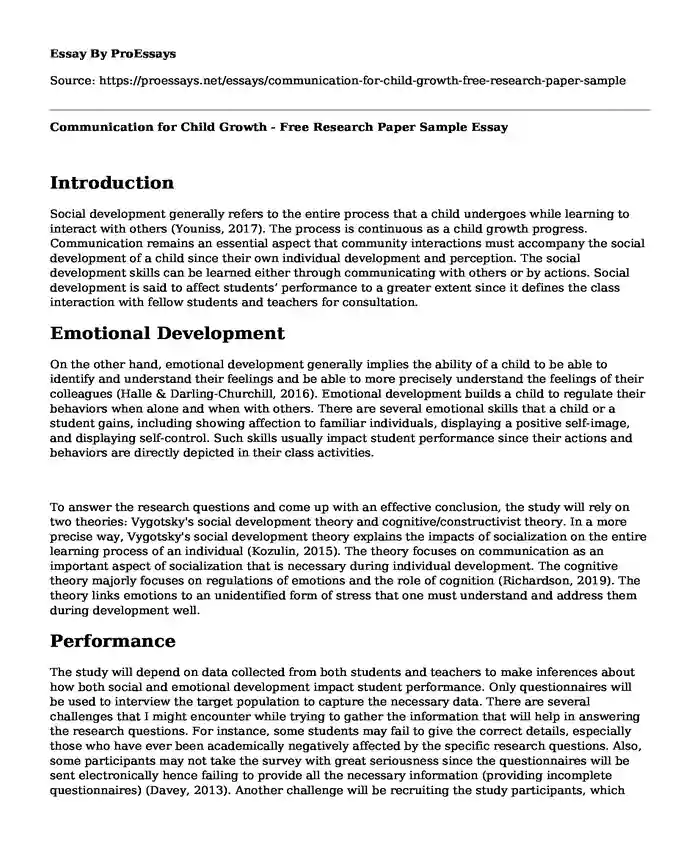Introduction
Social development generally refers to the entire process that a child undergoes while learning to interact with others (Youniss, 2017). The process is continuous as a child growth progress. Communication remains an essential aspect that community interactions must accompany the social development of a child since their own individual development and perception. The social development skills can be learned either through communicating with others or by actions. Social development is said to affect students’ performance to a greater extent since it defines the class interaction with fellow students and teachers for consultation.
Emotional Development
On the other hand, emotional development generally implies the ability of a child to be able to identify and understand their feelings and be able to more precisely understand the feelings of their colleagues (Halle & Darling-Churchill, 2016). Emotional development builds a child to regulate their behaviors when alone and when with others. There are several emotional skills that a child or a student gains, including showing affection to familiar individuals, displaying a positive self-image, and displaying self-control. Such skills usually impact student performance since their actions and behaviors are directly depicted in their class activities.
To answer the research questions and come up with an effective conclusion, the study will rely on two theories: Vygotsky's social development theory and cognitive/constructivist theory. In a more precise way, Vygotsky's social development theory explains the impacts of socialization on the entire learning process of an individual (Kozulin, 2015). The theory focuses on communication as an important aspect of socialization that is necessary during individual development. The cognitive theory majorly focuses on regulations of emotions and the role of cognition (Richardson, 2019). The theory links emotions to an unidentified form of stress that one must understand and address them during development well.
Performance
The study will depend on data collected from both students and teachers to make inferences about how both social and emotional development impact student performance. Only questionnaires will be used to interview the target population to capture the necessary data. There are several challenges that I might encounter while trying to gather the information that will help in answering the research questions. For instance, some students may fail to give the correct details, especially those who have ever been academically negatively affected by the specific research questions. Also, some participants may not take the survey with great seriousness since the questionnaires will be sent electronically hence failing to provide all the necessary information (providing incomplete questionnaires) (Davey, 2013). Another challenge will be recruiting the study participants, which will be done online. Some students and instructors who could have provided vast information could opt not to participate in the study. Failure to get valid and correct data will give misleading results; hence, I will not be able to perfectly answer the research questions. In the long run, incomplete concluding and some misleading recommendations may be made.
Conclusion
In conclusion, social and emotional development has several factors revolving around them. From basic research, these are the form of development that highly impact academic performance in most institutions. Therefore, the study will focus on two social development aspects (participation in discussions and student-teacher interactions) and two emotional development aspects (care for others' feelings and self-cognition).
References
Davey, G. (2013). M. A. Forrester (Ed.), Doing qualitative research in psychology: A practical guide. Qualitative Research in Psychology, 10(2), 218-220.
https://doi.org/10.1080/14780887.2011.578541
Halle, T. G., & Darling-Churchill, K. E. (2016). Review of measures of social and emotional development. Journal of Applied Developmental Psychology, 45, 8-18.
https://doi.org/10.1016/j.appdev.2016.02.003
Kozulin, A. (2015). Vygotsky’s theory of cognitive development. International Encyclopedia of the Social & Behavioral Sciences, 322-328.
https://doi.org/10.1016/b978-0-08-097086-8.23094-8
Richardson, K. (2019). Constructivist models. Models of Cognitive Development, 87-142.
https://doi.org/10.4324/9780429297571-3
Youniss, J. (2017). The nature of social development: A conceptual discussion of cognition. Issues in Childhood Social Development, 203-227.
https://doi.org/10.4324/9781315169675-8.
Cite this page
Communication for Child Growth - Free Research Paper Sample. (2023, Nov 25). Retrieved from https://proessays.net/essays/communication-for-child-growth-free-research-paper-sample
If you are the original author of this essay and no longer wish to have it published on the ProEssays website, please click below to request its removal:
- How Stress Affects Our Health Essay
- Feminine Identity Essay Example
- Department Store Experiment Observation Report Paper Example
- Symptoms of Anorexia Essay Example
- Article Analysis Essay on Nurse Burnout
- Essay Sample on Empathy: The Key to Preventing Social Problems Like Bullying
- Essay Example on Trees Talking: Unravelling the Symbiotic Networks of Nature with Suzanne Simard







